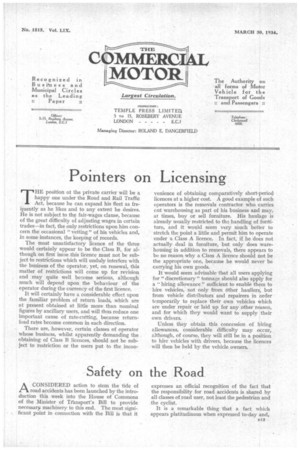Pointers on Licensing
Page 19

If you've noticed an error in this article please click here to report it so we can fix it.
THE position ot the private carrier will be a happy one under the Road and Rail Traffic Act, because he can expand his fleet as fre'quently as he likes and to• any extent he desires. He is not subject to the fair-wages clause, because of the great difficulty of adjusting wages in certain trades—in fact, the only restrictions upon him concern the occasional " vetting " of his vehicles and, in some instances, the keeping of records.
The most unsatisfactory licence of the three would certainly appear to be the Class B, for although on first issue this 'licence must not be subject to restrictions which will unduly interfere with the business of the operator, yet, on renewal, this matter of restrictions will come up for revision and may quite well become serious, although much will depend upon the behaviour of the operator during the currency of the first licence.
It will certainly have a considerable effect upon the familiar problem of return loads, which are at present obtained at little more than nominal figures by ancillary users, and will thus reduce one important cause of rate-cutting, because returnload rates become common in each direction.
There are, however, certain classes of operator whose business, whilst apparently demanding the obtaining of Class B licences, should not be subject to restriction or the users put to the incon venience of obtaining comparatively short-period licences at a higher cost. A good example of such operators is the removals contractor who carries out warehousing as part of his business and may, at times, buy or sell furniture. His haulage is already usually restricted to the handling of furniture, and it would seem very Much better to stretch the point a little and permit him to operate under a Class A licence. In fact, if he does not actually deal in furniture, but only does warehousing in addition to removals, there appears to be no reason why a Class A licence should not be the appropriate one, because he would never be carrying his own goods.
It would seem advisable that all users applying for " discretionary " tonnage should also apply for a hiring allowance" sufficient to enable them to • hire vehicles, not only from other hauliers, but from vehicle distributors and repairers in order temporarily to replace their own vehicles which are under repair or laid up for any other reason, and for which they would want to supply their own drivers.
Unless they obtain this concession of hiring allowances, cothiderable difficulty may occur, although, of course, they will still be in a position to hire vehicles with drivers, because the licences will then be held by the vehicle owners.












































































